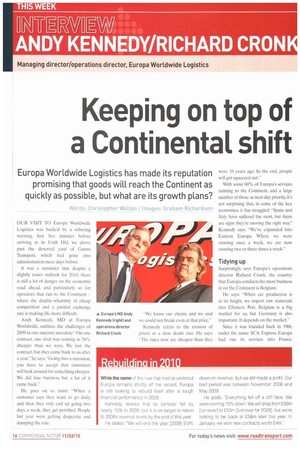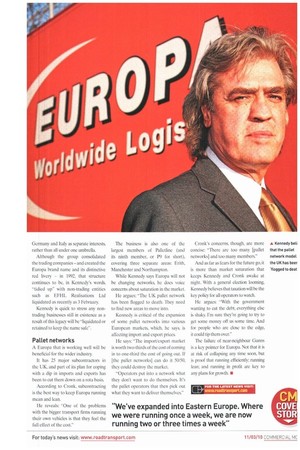Keeping on top of a Continental shift
Page 16

Page 17

If you've noticed an error in this article please click here to report it so we can fix it.
Europa Worldwide Logistics has made its reputation promising that goods will reach the Continent as quickly as possible, but what are its growth plans?
Words: Christopher Watton 1 Images: Graham Richardson OUR VISIT TO Europa Worldwide Logistics was backed by a sobering warning. Just live minutes before arriving at its Erith HQ, we drove past the deserted yard of Gunns Transport, which had gone into administration mere days before.
It was a reminder that despite a slightly rosier outlook for 2010. there is still a lot of danger on the economic road ahead, and particularly so for operators that run to the Continent where the double-whammy of cheap competition and a painful exchange rate is making life more difficult,
Andy Kennedy, MD at Europa Worldwide, outlines the challenges of 2009 in one succinct anecdote:"On one contract, one rival was coming in 26% cheaper than we were. We lost the contract, but they came back to us after a year," he says. "Going into a recession. you have to accept that customers will look around for something cheaper. We did lose business, hut a lot of it came back."
He goes on to insist: "When a customer says they want to go daily. and then they only end up going two days a week, they get petrified. People last year were getting desperate and dumping the rate. We know our clients, and we said we could not break even at that price."
Kennedy refers to the erosion of prices as a slow death rate. He says: "The rates now are cheaper than they
were 10 years ago. In the end, people will get squeezed out."
With some 60% of Europa's services running to the Continent, and a large number of those as next-day priority, it's not surprising that, in some of the key economies, it has struggled: "Spain and Italy have suffered the most, hut there are signs they're moving the right way," Kennedy says "We've expanded into Eastern Europe. Where we were running once a week, we arc now running two or three times a week."
Tidying up Surprisingly. says Europa's operations director Richard Cronk, the country that Europa conducts the most business in on the Continent is Belgium.
He says: "When car production is at its height, we import raw materials into Ellsmere Port, Belgium is a big market for us, but Germany is also important. It depends on the market."
Since it was founded back in 1966, under the name SCA Express, Europa had run its services into France.
Germany and Italy as separate interests, rather than all under one umbrella.
Although the group consolidated the trading companies -and created the Europa brand name and its distinctive red liven/ in 1992, that structure continues to be, in Kennedy's words, "tidied up" with non-trading entities such as EFHL Realisations Ltd liquidated as recently as 3 February.
Kennedy is quick to stress any nontrading businesses still in existence as a result of this legacy will be "liquidated or retained to keep the name safe".
Pallet networks
A Europa that is working well will be beneficial for the wider industry.
It has 25 major subcontractors in the UK, and part of its plan for coping with a dip in imports and exports has been to cut them down on a rota basis.
According to Cronk, subcontracting is the best way to keep Europa running mean and lean.
He reveals; "One of the problems with the bigger transport firms running their own vehicles is that they feel the. full effect of the cost." The business is also one of the largest members of Palletline (and its ninth member, or P9 for short), covering three separate areas: Erith. Manchester and Northampton.
While Kennedy says Europa will not be changing networks, he does voice concerns about saturation in the market.
He argues: "The UK pallet network has been flogged to death. They need to find new areas to move into.
Kennedy is critical of the expansion of some pallet networks into various European markets, which, he says. is affecting import and export prices.
He says: "The import/export market is worth two-thirds of the cost of coming in to one-third the cost of going out. Ti [the pallet networks] can do it 50/50, they could destroy the market.
"Operators put into a network what they don't want to do themselves. It's the pallet operators that then pick out what they want to deliver themselves." Cronk's concerns, though, are more concise: "There are too many [pallet networks] and too many members."
And as far as fears for the future go, it is more than market saturation that keeps Kennedy and Cronk awake at night. With a general election looming. Kennedy believes that taxation will be the key policy for all operators to watch.
He argues: "With the government wanting to cut the debt, everything else is shaky. I'm sure they're going to try to get some money off us some time. And for people who are close to the edge, it could tip them over."
The failure of near-neighbour Gunns is a key pointer for Europa. Not that it is at risk of collapsing any time soon, but is proof that running efficiently; running lean: and running in profit are key to any plans for growth. •








































































































































